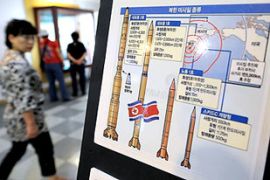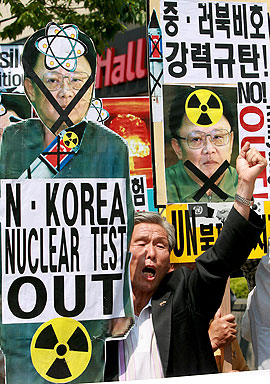N Korea warned of ‘consequences’
US secretary of state says Washington will defend S Korea and Japan against any threat.

Both South Korea and Japan are within missile range from North Korea.
However, Clinton said that North Korea would still have the opportunity to return to talks on halting their nuclear programme under the six-party framework.
In the negotiations between the two Koreas, China, Japan, Russia and the US, North Korea agreed in 2005 to abandon its nuclear programmes.
But it has subsequently conducted two nuclear tests, one in October 2006 and a stronger one this week.
Clinton said that it was the intention of diplomats’ dealing with the issue to rein in Pyongyang and get them to stick to commitments made in those discussions.
Ending armistice
North Korea earlier declared an end to its half-century-old armistice with the South, saying that it sees Seoul’s move to join a US-led anti-proliferation initiative as a “declaration of war”.
| In depth |
|
Videos |
Following Monday’s nuclear test, South Korea announced that it would become a full member of the Proliferation Security Initiative (PSI), a US-led drive to curb trade in weapons of mass destruction.
It said the decision had already been taken following the North’s controversial April 2 rocket launch, although the formal announcement was brought forward in the wake of the latest nuclear test.
But Pyongyang gave warning on Wednesday that any interception of its ships would constitute an “unpardonable infringement” on its sovereignty which would be met with “merciless punishment”.
“Any tiny hostile acts against our republic, including the stopping and searching of our peaceful vessels … will face an immediate and strong military strike in response,” it said in a statement by the state-run Korean Central News Agency.
Saying that the US had drawn South Korea into the PSI, the North Korean statement said it would also “no longer be bound” by the 1953 armistice that ended the Korean War.
Without a binding ceasefire “the Korean peninsula will go back to a state of war”, a North Korean military representative was quoted as saying, adding that the North’s troops would take “corresponding military action”.
“The US imperialists and the traitor Lee Myung-bak’s group have driven the situation on the Korean peninsula into a state of war,” the statement said.
Icy ties
Cross-border ties have been icy since Lee, the South Korean president, took office in Seoul in February 2008 and declared Seoul would take a tougher stance with the North.
 |
| Pyongyang’s nuclear test and series of missile launches has sparked a global outcry [EPA] |
The warning carried on state media came as South Korea’s largest newspaper reported that the North had re-started its main plutonium producing nuclear reactor at Yongbyon.
The Chosun Ilbo said US spy satellites had spotted activity at the plant in Yongbyon, indicating that operations to produce weapons-grade plutonium had resumed.
“There are various indications that reprocessing facilities in Yongbyon resumed operation [and] have been detected by US surveillance satellite, and these include steam coming out of the facility,” it quoted an unnamed government source as saying.
The North had previously agreed to dismantle Yongbyon under a breakthrough deal in 2007.
However, the follow-up agreements fell apart and the six-party talks that concluded the agreement stalled in April when the North said it had scrapped the agreement and would resume work on building nuclear weapons.
Al Jazeera’s Tony Cheng, reporting from Seoul, said the report of fresh activity at Yongbyon was credible given the North’s angry threat in April that it would resume work at the plant.
That came after North Korea fired a rocket that it said had placed a satellite into orbit in April, although the US said it believed the launch was a cover for a test of long-range missile technology.

